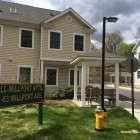News
P&Z Chair on Developer Loophole: ‘There Are Some Real Threats’
|
Though he declined to name specific properties (so as not to give anyone ideas), the chairman of the Planning & Zoning Commission on Wednesday said the town is at risk of seeing unwanted housing complexes shoehorned into New Canaan by developers leveraging a state law whose spirit and intended purpose—not always evident in practice—is to boost affordable housing stock. Under normal circumstances, that’s a widely embraced goal by New Canaanites who point to valued, essential workers such as teachers, police, firefighters and public works crewmen as candidates for affordable units. Yet the Affordable Housing Appeals Act (sometimes called “8-30g” for its statute number) when abused is a tool that developers wield in order to get around rejections of site plans locally. “There are several parcels in town which may be targeted by—and I’m sorry to say this—probably mostly out-of-town developers who would like to come in and propose 8-30g affordable units there,” P&Z Chairman Laszlo Papp said Wednesday during a Town Council meeting. The law is triggered in municipalities where less than 10 percent of the housing stock is considered “affordable,” by the state’s definition.

